- Home
- Neal Shusterman
Shattered Sky Page 2
Shattered Sky Read online
Page 2
Bobby shrugged. “Suit yourself,” he said. Tessic slid onto a stool. The old man sounded apologetic. “I was sure you’d be used to more highfalutin black-tie kinds of establishments.”
“Highfalutin bores me. That’s why I come here.”
Bobby smiled.
Tessic ran a hand through his salt-and-pepper hair, just a tad too long to be corporate. Like his clothes, it was genteelly defiant. He was a mote in the eye of the system, liked it that way, and as the twelfth richest man in the world, by the reckoning of Fortune magazine, he was one splinter that wouldn’t easily be removed.
“So will it be the usual, then?” Bobby asked.
“Of course!”
Bobby went off to his pastry display case. “Lucky I even have it. If I woulda known you was comin’ I coulda baked it up fresh. As it is, I only got a couple of pieces left.” He took out a plate and a pie server, then gently lifted a piece of chess pie onto the plate. Even chilled, the thick filling oozed out over the plate, its chunky surface of nuts and chocolate slowly slipping on the rich nougat like a rock slide. Tessic dug in, took a mouthful, and savored the sweetness. Tessic considered himself a man who could appreciate the finer things in life—and knew they didn’t always come with a hefty price tag. It was this appreciation that balanced him, and kept him at ease in most any situation.
As Tessic ate, Bobby leaned in closer and whispered. “I got myself a nice piece of Tessitech stock last month.” He said it as if it were a classified secret. “Made me five hundred bucks already. Guess I oughta thank you for helpin’ me get my granddaughter through college!”
“I didn’t know you had a granddaughter that old.”
Bobby nodded. “Got accepted to Princeton, and is hell bent on going. We’re working out some financial aid. But if Tessitech stock keeps climbing the way it’s been it might be the only financial aid she needs!”
“So much faith you have in my company!”
“Well, I figure the world’s going to hell in a handcart. Weapons technology’s got to be a growth industry.”
Tessic grinned dreamily around a mouthful of pie, then said: “I have challenged a dozen chefs to make a pie this good. None have succeeded.”
“No one will. Call it my little contribution to humanity.”
“I would very much like the recipe.”
“So would half the country.”
“If half the country comes in here, business must be good!”
Bobby sighed. “Business comes and goes. Mostly goes. I thought I’d start seeing some military men come in once they took over that plant and all. But it’s only been you. The others rarely come in or out of the plant. And when they do, they speed past this place like it don’t exist.” Bobby paused, and pretended to clean a glass, but his attention never left Tessic. “Y’ever gonna tell me what goes on in there?”
Tessic grinned. “Is that the price of your recipe?”
“I suppose we could swap national secrets, huh?”
“Secrets are secrets, eh? The government can buy my silence, but they can’t buy your recipe. I, on the other hand, would like to do just that.” He reached into the pocket of his overcoat, and produced a checkbook. Bobby waved it away.
“Hell, no! I was gonna give it to you anyway. You don’t have to pay me.”
“I insist.” Tessic scribbled in the checkbook. “You can put it toward your granddaughter’s tuition.” He folded the check and slipped it into Bobby’s apron pocket.
“Aw hell. Well, then that piece you just had is on the house.” He took a napkin, writing down the recipe from memory. “It don’t take a brain surgeon to make.” When he finished he handed it to Tessic. “You ain’t gonna sell it to Sara Lee, now, are you?”
“I give you my word.”
Tessic stood, straightening his overcoat.
“I suppose you won’t need to come here anymore, now that you got the recipe.”
“And miss your company?” Tessic pulled open the door. “Rest assured, you’ll see me again.”
Tessic left and drove off in his silver Jag. In the diner, Bobby cleaned up Tessic’s plate and then almost as an afterthought slipped the check from his pocket, suspecting that Tessic had given him a digit or two more than the recipe commanded. But the number that stared back at him was so laden with zeros it almost seemed to gain weight in his hand. It was enough to send all his grandchildren to Princeton. His wind stolen from him, he sucked a deep breath, and leaned on the counter to steady himself.
“Hey, Pops,” called one of the truckers at the far booth, “you gonna fill up this coffee or what?”
“Yeah, yeah, be right there.” He looked at Tessic’s check again, blinking as if the number might disappear. The man’s crazy! he thought. I can’t accept this.
But as he went back to pour coffee for the griping truckers, he realized yes, I most certainly can.
HALF A MILE AWAY, Tessic’s sound system blasted Vivaldi as he was waved through the guard gate of the plant. He was the only civilian granted unrestricted access. One of the perks of having friends in high places, and a vested interest in the facility. With the gate closing behind him and the winding, forested road to the plant up ahead, Tessic changed his personal audio soundtrack to the Rolling Stones, to remind him that, at fifty-six, he wasn’t quite as old as he sometimes felt. He looked at the recipe-scribbled napkin that lay on the seat next to him and smiled. No recipe was worth what he had paid, but then, a mitzvah was not measured in dollars and cents. Besides, altruism was the best kind of business investment.
He shifted into a higher gear, singing along to “You Can’t Always Get What You Want,” feeling quite pleased with himself as he sped down his own particular path of enlightenment.
2. MADDY
* * *
TRANSCRIPTION EXCERPT, DAY 193. 13:45 HOURS
“They drug me when they take me out now. Problem is I metabolize the stuff so fast, they gotta give me elephant doses. Can’t be healthy.”
“Open wide. I can’t see your mouth through the hole.”
“I feel like a slot machine.”
“If you were a slot machine, I might get something back.”
“Naah. Suckers’ game.”
“Not with you around. Everyone knows how you shot down Las Vegas.”
“To hell with Las Vegas. The slot machines all come up triple sevens, and a million people think it’s something biblical.”
“Is it?”
“How should I know? If the wheels had sixes instead of sevens, they would say I was the Antichrist.”
“Haven’t you heard? You are.”
“Yeah, I’ve heard that one, too.”
“WOULD YOU GIVE YOUR life for your country, Lieutenant Haas?” General Bussard had asked. “Would you give your soul?”
The second question caught her off guard. But as always, she had answered unhesitatingly. “Without pause, sir.” Bussard had shown no reaction, but apparently she had shown the right level of commitment, because she had been chosen for posting to the elite staff of Project Lockdown. Now, however, months after the interview, she remained in the dark as to what exactly the project was. Even as a freshly minted Army Lieutenant she knew better than to ask too many questions. But even by Army standards the silence was deafening.
“It’s Area 51 all over again,” her sister Erica mused, as they sat saying good-byes at Chicago’s O’Hare airport. “Why would you ask to be assigned to the Hesperia plant?” Her sister nursed a Starbucks decaf latte. The drink was so like Erica, Maddy thought: all style and no bite. Like the way she drove her Porsche—always on cruise control. Maddy, on the other hand, liked her coffee no-nonsense black, and hot enough to cauterize a tonsillectomy.
Maddy glanced around, brushing a hand through her dark hair, short enough to be military, but long enough to keep her as feminine as she cared to be. The airport coffee house had a full complement of harried travelers. Everyone was too absorbed in their own transit ennui to care about Maddy and Erica’s conversa
tion. Still Maddy was careful not to raise her voice.
“I didn’t ask,” she told Erica. “Assignments are handed out. We go where we’re told.”
Erika snorted. “Oh, please! Spare me the party line. You can’t tell me a West Point cum laude doesn’t get courted by half the military—even the ones who don’t expect to get into your pants.”
Maddy gulped her coffee, and relished its scalding sting. “It’s still a boys’ club.” But, of course, Erica was right. Even in spite of the boys’ club fraternity she did have quite a lot of options available to her. But rumors of an informational black hold in Hesperia, Michigan, had piqued her curiosity. Mystery was Maddy’s nemesis, and she had become obsessed with knowing what they were hiding, or building, or dismantling in that dead power plant. Rumors had abounded in the halls of West Point—rumors that the Hesperia plant was housing some new Manhattan Project. After all, with the state of the world disintegrating at such an exponential rate over the past year, there was no telling where the next threat would come from. Some even believed the plant was the entryway into a series of subterranean tunnels built for an elite few to survive whatever dark age they were all spiraling toward.
Maddy went up to the counter for a second cup, but was brusquely reminded that, along a thousand other things in the crumbling world economy, there was a shortage of coffee, and even Starbucks was rationing. She settled for some hot water with lemon, then, disgusted, dumped the whole thing into the trash before returning to her sister, who was craning her neck to catch sight of the departure boards, looking for a flight that might or might not actually happen. Her sister was headed to New York to some ex-boyfriend, who had decided that pigs had, indeed, flown and he was deeply ready for commitment.
“All those freaks on street corners proclaiming the end of the world finally got to him,” Erica had told her. “He probably just wants to get laid before it happens.”
Maddy’s flight was just a short hop to Grand Rapids, where she would finally be briefed on her assignment at the Hesperia facility.
“Maybe you get to babysit little green men,” Erica suggested.
“More likely gray,” Maddy informed her. “Haven’t the Roswell lunatics taught you anything?”
Erica gave the obligatory chuckle, and gulped the dregs of her latte. “Roswell freaks, Backwash communes—maybe you’ve got the right idea. Lock yourself behind a fence. At least you won’t get nabbed by some damn Colist cult.”
Maddy had to admit she had been, for the most part, shielded at West Point from the aftermath of the Colorado River Backwash. But even so, she knew it was the defining event in people’s lives. Like so many of those who had flocked to the spot where Hoover Dam once stood, she had wanted to witness it as well—to watch the waters of the Colorado River flow upward, in a rising backwash against the pull of gravity, into Lake Mead, if only to prove to her doubting spirit that it ever really happened. Then maybe she, too, might have joined so many others, searching the waters for the body of the martyred Dillon Cole.
Maddy knew it was more than Hoover Dam that had shattered that day. The very nature of creation was shaken to its foundations. If they had suddenly discovered that the world was flat, its consequences could not have been more far reaching than the physical impossibility of a mighty river crashing uphill at a thirty-percent grade. In a matter of days cults began to spontaneously generate on society’s fringes and had quickly germinated into the mainstream. Maddy had found it both frightening and wondrous.
A United 747 came in for a landing and Maddy watched idly as its tires squealed to earth, setting off a tiny puff of smoke on the tarmac. In a moment the jet was a beast of the ground again, ponderous metal that seemed too impossibly heavy to fly. But here was a case of mind over matter—science over perception, mused Maddy. No matter how heavy a plane appeared, Bernouli’s principle assured flight every time a mechanically sound jet sped toward the dead end of the runway. There had always been some comfort in the fact that some natural laws could never be repealed. Slim comfort now.
“Dare I ask what you think about all that business? The Backwash and all?” Erica asked.
“Three generals came to West Point just to tell us not to think about the Backwash.”
“So why do you?”
“Contrary to popular opinion,” Maddy said with a smirk, “cadets, and even we pissant fledgling officers, do have minds of our own. I just wish I could have seen the Backwash with my own eyes before it dried up.”
“Not me,” Erica said. “I have a problem with miracles.”
There was no use pressing this with Erica—she had never been plagued by images of the Big Picture. Fact: Dillon Cole had shattered the law of entropy before he died in the Backwash. But how? Even now, in the places Dillon Cole had trodden, order still flowed from disorder, defying the most basic law of physics. With the law of entropy suddenly removed from the foundation, what, at the end of the day, would be left standing?
You think too much, Erica was fond of reminding Maddy. “You know what I did the day the dam broke?” said Erica. “I had a Backwash party. We poured vodka into Kahlua until we couldn’t tell which way was up, so it didn’t matter where the hell the water was going.”
“That’s what I love about you, Erica. The only proof you need is 180.”
A team of junior executives hurried past. One of them caught Maddy’s eye. He was no older than herself, twenty-two or so, tops. He noticed her gaze, and held eye contact just long enough to acknowledge it before vanishing into the crowd.
“Roll in that tongue, Madeline,” Erica said with a smirk. “What would Mom say?”
“She’d say to bring one home for her.”
Maddy thought back to her tally of distracting, if not quite fulfilling, relationships at the academy, and wondered what opportunities her new assignment might provide. She shouldered her carry-on. “I’d better go or I’ll miss my flight.”
“Hah—fat chance of that!” Erica nodded toward the departure screens. In spite of good weather, most flights were interminably delayed, several were canceled, and those flights that actually did make it out did so on dubious jets in desperate need of maintenance. Even now, the aircraft pulling up right outside their window looked weak and world-weary.
“Look at that thing,” said Maddy. “It’s like the poster child for metal fatigue.”
It was amazing to think that Americans—so smug in their preeminence—had once scoffed at the shoddy state of air travel in Third-World nations and—worst of all—Eastern Europe. Maddy smile ruefully. Now every airline was Aeroflot.
If it were only air travel, the ailment could have been cured, or at least treated—but it seemed every other world system was infected as well. Pundits waxed rhetorical day in and day out about a volatile global economy. Conservatives lamented the loss of traditional values. Liberals attacked greedy corporate interests. Zealots and zanies predicted the coming of, or the death of, God. There were a thousand other reasons why the thin veneer of civilization was suddenly being stripped to the grain. But the answer was clear to Maddy: If the power of one person’s thought could shatter the world’s greatest dam and turn back the massive flood that followed; if there were someone in this world who could do that—then where was the validity of science and reason? Who wouldn’t lose interest in their job and the petty ins-and-outs of their own life? And since civilization depended upon seven billion docile and compliant cogs keeping the Grand Clockwork running smoothly, how could the system function with hundreds of thousands of mutinies and desertions, as workers suddenly left their jobs, abandoning their old lives? It didn’t take an economic sage to figure out that everything from airlines to food lines would soon come grinding to a halt.
It was the great irony of civilization—that in the end it wasn’t a bomb, or terrorism or some other global cataclysm that brought down the curtain on this modern world. It was lack of interest.
They both stood, taking deep breaths, preparing to launch into the frenetic stream
of anxious travelers. “Once I get to Brooklyn,” Erica said, “I’m swearing off the friendly skies for good and staying put. Because if I gotta live through the fall of the American Empire, I might as well do it somewhere trendy.”
Maddy hugged her sister, perhaps for the last time in the foreseeable future, then turned away, forcing her feet in front of her, marching toward her overcrowded gate with disciplined military cadence. Refusing, as always, to look back.
THE MASSIVE VAULT SAT in the cold, seven-story dome of the power plant, a square peg in a round hole. This, reasoned Maddy, was where the plant’s nuclear core would have been, but any machinery had long since been disassembled to make room for this cubic concrete egg in the cold womb of the containment dome. The cube was thirty feet on each side, and the only thing that gave away the fact that it was not solid was a silver titanium vault door on its face—a door which, by the way, was currently wide open. Looking around, Maddy could see no gateway into the dome large enough for this massive, incongruous object to fit through—which meant it must have been built right there.
General Bussard, a slab of a man in both appearance and personality, studied her reaction to the cube. “Not what you were expecting, Lieutenant?”
“Just observing, sir,” Maddy answered truthfully. “I didn’t know what to expect.” The cavernous dome was lit dimly from above like the unpleasant half-light of a partial eclipse. The walls around them were filigreed with pipes, conduits and catwalks casting intersecting shadows. Maddy counted four sharpshooters posted on high catwalks, giving them a full view around the cube. Otherwise there was no one else present. She had anticipated that, whatever the purpose or nature of the installation, there would be swarms of personnel. Their absence did not bode well with her. Neither did the open vault door.
“This is my show,” Bussard announced. In the cavernous space his voice rang with a hollow echo. Maddy assumed he had saved the reading of his riot act for this moment, when his voice would be most imposing. “You are not to discuss your work with anyone, either civilian or military. I am your sole confidant in all matters concerning this facility. Any comments or questions are to be directed to me, and me alone.”

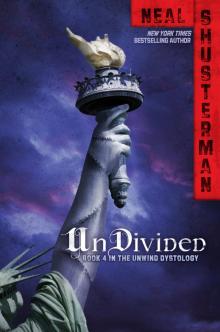 UnDivided
UnDivided UnBound
UnBound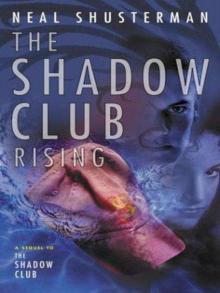 The Shadow Club Rising
The Shadow Club Rising Scorpion Shards
Scorpion Shards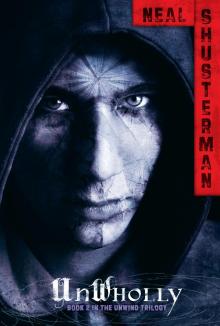 UnWholly
UnWholly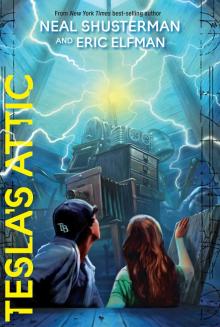 Tesla's Attic
Tesla's Attic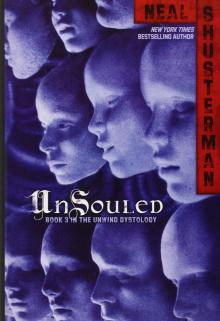 UnSouled
UnSouled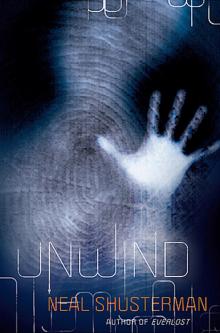 Unwind
Unwind Violent Ends
Violent Ends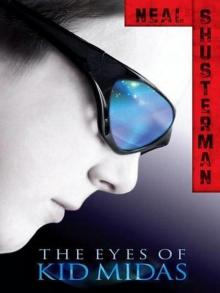 The Eyes of Kid Midas
The Eyes of Kid Midas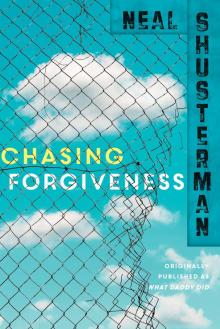 Chasing Forgiveness
Chasing Forgiveness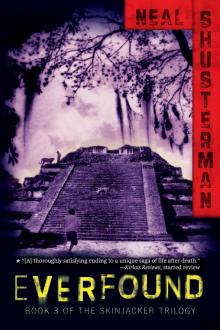 Everfound
Everfound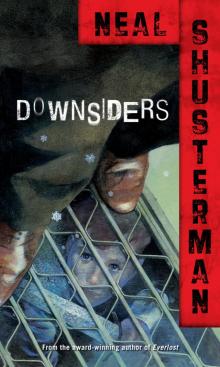 Downsiders
Downsiders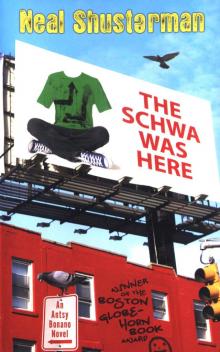 The Schwa Was Here
The Schwa Was Here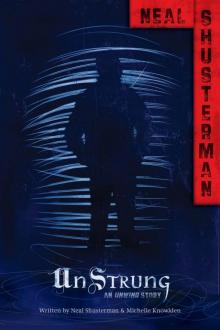 UnStrung
UnStrung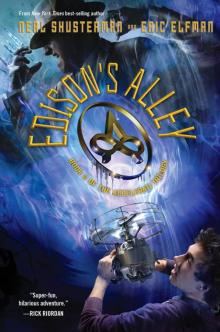 Edison's Alley
Edison's Alley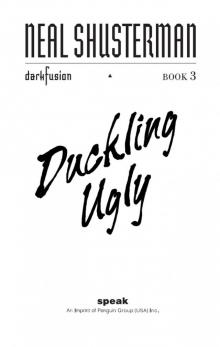 Duckling Ugly
Duckling Ugly Everlost
Everlost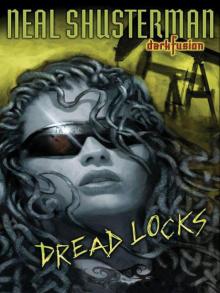 Dread Locks
Dread Locks Antsy Floats
Antsy Floats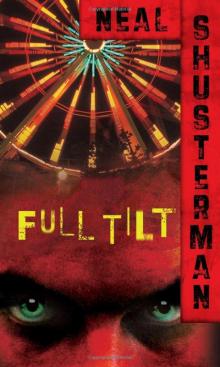 Full Tilt
Full Tilt Thunderhead
Thunderhead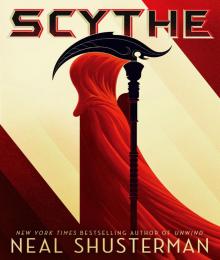 Scythe
Scythe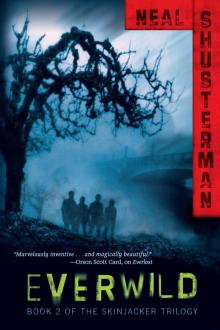 Everwild
Everwild Challenger Deep
Challenger Deep Shattered Sky
Shattered Sky Red Rider's Hood
Red Rider's Hood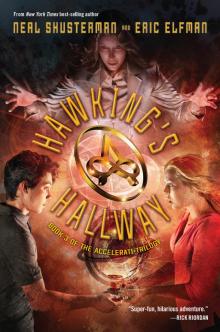 Hawking's Hallway
Hawking's Hallway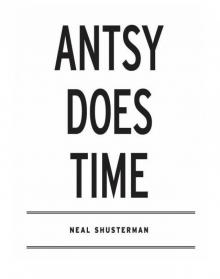 Antsy Does Time
Antsy Does Time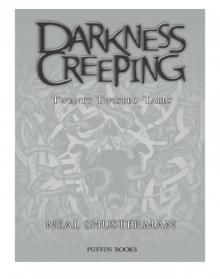 Darkness Creeping: Twenty Twisted Tales
Darkness Creeping: Twenty Twisted Tales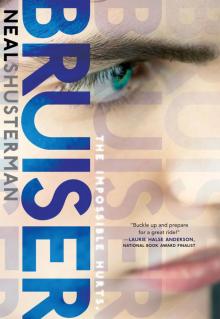 Bruiser
Bruiser Thief of Souls
Thief of Souls The Toll
The Toll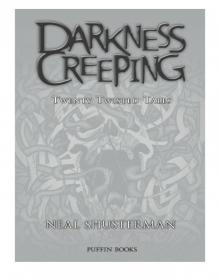 Darkness Creeping
Darkness Creeping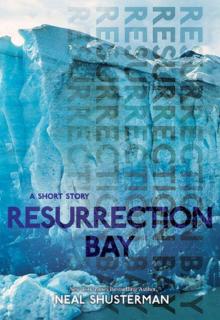 Resurrection Bay
Resurrection Bay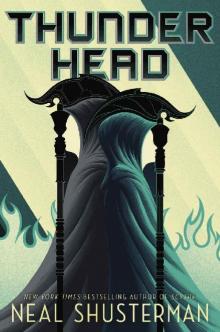 Thunderhead (Arc of a Scythe Book 2)
Thunderhead (Arc of a Scythe Book 2)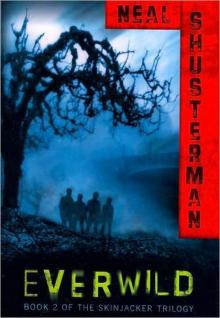 Everwild (The Skinjacker Trilogy)
Everwild (The Skinjacker Trilogy)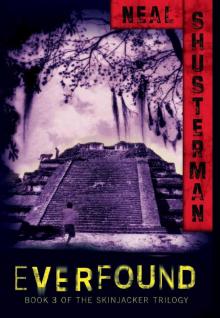 Everfound s-3
Everfound s-3 Edison’s Alley
Edison’s Alley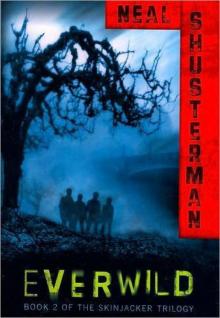 Everwild s-2
Everwild s-2 Dry
Dry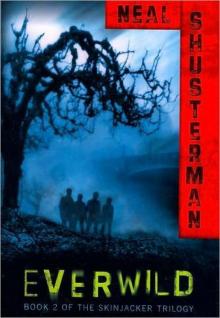 Skinjacker 02 Everwild
Skinjacker 02 Everwild Everlost s-1
Everlost s-1